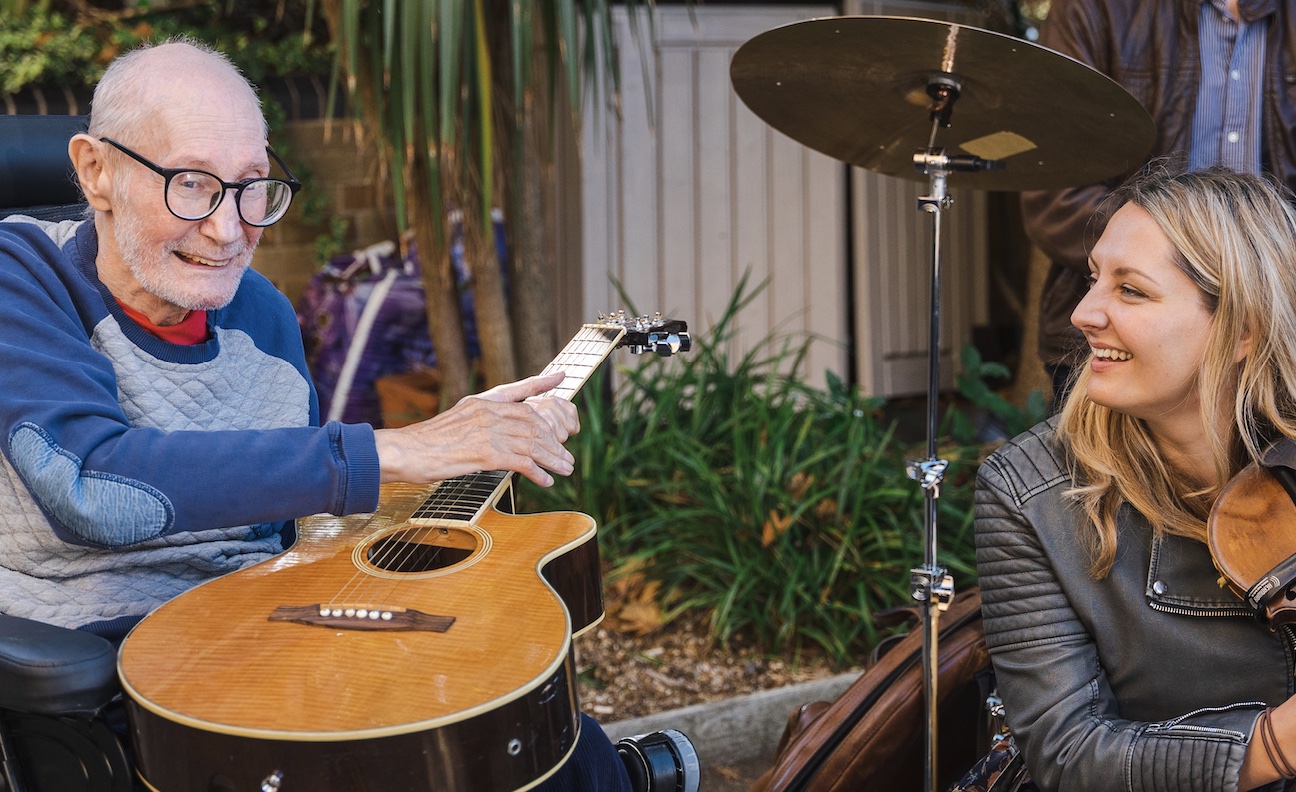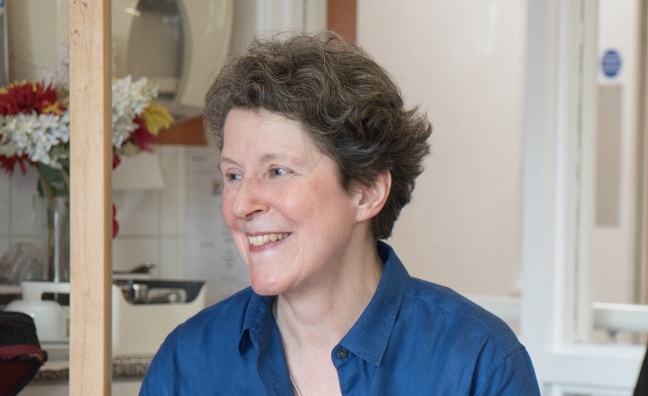At the end of last year, The Spitz Charitable Trust – named after the London music venue in Spitalfields market – celebrated its 10 year anniversary of delivering interactive live music to improve the health of those who need it most.
Whilst the venue closed its doors for the final time in 2007, Jane Glitre, who had been running it, transformed her work with the musicians who had played at the venue into using performance as a way to tackle issues such as loneliness and isolation.
In 2013, The Spitz was awarded charitable status, and over the past decade they have had leading UK musicians including Alice Zawadzki, Ben Hazleton and Marcus Bonfanti provide their own intimate and participatory music sessions for people who need it – from babies in intensive care to those receiving end of life support.
The Spitz celebrated its 10-year milestone with a party for residents and musicians at Bridgeside Lodge Care Home in Islington, where it has been based since 2018.
Throughout their work, The Spitz have become a prime example of why many across the industry have called for music to become an integral part of healthcare, and partners including the National Academy For Social Prescribing, Music For Dementia and Universal Music UK have also been working to launch initiatives that support their work.
The Spitz has also played at both Great Ormond Street Hospital and at Northwick Park Hospital, where they worked with dementia consultant Dr Mahua Chatterjee to organise a two-week pilot study to understand the impact live music had on patients’ moods – 88% of responses noted a change occurred after musicians performed.
Here, to celebrate over a decade of The Spitz’s work, Music Week talks to founding director Jane Glitre to hear all about the charity’s mission and some of her most memorable moments…
It’s been over ten years since The Spitz was awarded Charitable status, what are you most proud of in terms of the work you’ve done since then?
“I’m really proud of the impact our work has on beneficiaries of all ages, from older people in care homes, right down to new-born babies at Great Ormond Street Hospital. During the pandemic, the manager of Bridgeside Lodge Care Home considered our work so important that we were designated as ‘essential workers’ which meant we could continue entering the care home to deliver live music to residents. The trust placed in us meant so much at such a crucial time for the care sector and for our musicians – their value was recognised at a time when all other live music disappeared. Over the years we have assembled a wonderful team, both musicians and those working behind the scenes. There is a strong sense of collective purpose, understanding the ethos of our work, and what The Spitz is trying to achieve in collaboration with care staff.”
What palpable difference do you believe The Spitz has made?
“We have undoubtedly changed and improved the quality of life of people in care, enabling them to really live, rather than just exist. We’ve brought in high-quality live music to people who otherwise would not have access to it and have forged friendships through that. Our work has, in some cases, [helped] extend the lives of care home residents and it has provided comfort at the end of life for others. We also hear similar responses to our work regardless of the differing locations. We recently visited Northwick Park Hospital in West London, where a son visiting his elderly father told us that he hadn’t seen his dad so present and engaged for ages. Later that week at Great Ormond Street Hospital, the mother of a very young girl said it had been a very long time since her daughter had smiled and made eye contact with someone the way she did with our musician.”
You’ve had artists provide intimate participatory sessions for those who need it most. What would be your message to artists and managers in the industry about the impact it can have on the lives of those in need? What support do you need from the industry and what kind of difference would this make?
“Our message to artists would be that, as a musician, you literally have the power to change someone’s life. It’s easy to take musicianship for granted, but in recent years we have seen how a lack of live music, and the arts more broadly, can impact our wellbeing and mental health. Pianist Bruno Heinen even said, ‘Playing music in the care home and making deep connections with people through music has helped me to remember why I love playing,’ and songwriting with residents really allows them to reflect on their lives, process memories and gives them a creative outlet. We are always grateful to those who spread awareness of our work and of the potential for musicians to change lives through music because, [while] this work improves the lives of those living in care, it can also provide musicians with a viable, well-paid and rewarding alternative to more conventional gigging and touring.”
Are there any special memories that you can share from those sessions?
“We had a resident at Bridgeside Lodge Resident, JC, who arrived in 2017 [when he] was very poorly and anxious. He was scared, unwilling to leave his room or engage with anyone. It was thought that he had not long left to live, but after several months of offering to play music for him in his room and being politely rebuffed, he eventually accepted – first asking us to play outside his door, then actually in his bedroom. Eventually he joined us for music in the garden, and he relaxed, smiled, sang and the very next day insisted, ‘Get me a guitar!’ Six years later he is the life and soul of the party, has written several songs with Spitz musicians and is full of a joie de vivre we could never have imagined when we first met him.
 Bridgeside Lodge resident JC with musician Alice Zawadzki
Bridgeside Lodge resident JC with musician Alice Zawadzki
“Music has the power to touch people in the advanced stages of dementia when very little else can reach them. I remember a day when two of our musicians were playing for a woman at Bridgeside Lodge Care Home – her condition had worsened and she was becoming more withdrawn and confused, but when musicians Alice Zawadzki and Pete Lee began playing Over The Rainbow, she looked right at them and began to cry. She told us that the song reminded her of her children.”
You have talked about how music being used for health is a growing alternative mode of work and career potential for professional musicians. Do you think that’s an under-explored path for a lot of musicians?
“The recent Musicians’ Census, compiled by Help Musicians and the Musicians’ Union, showed that the average musician’s annual income is £20,700. While The Spitz pays our musicians a good fee, we would discourage anyone from taking on this type of work purely for financial reasons because it should be approached with consideration, empathy and a desire to reach isolated people.
“Success as an artist can be measured in many different ways, but the musicians who work with us consider this to be the most rewarding and impactful part of their working lives. Guitarist Marcus Bonfanti said that the work at The Spitz had made him ‘Fall back in love with music’ in a way he never thought he’d experience again. He said, ‘In turn, I have been able to approach the day-to-day life of being a musician (which I had battled with over the years) with a new attitude.’”
To what extent is it a more financially rewarded line of work than live performance?
“From a financial viewpoint, the work [we do] affords musicians the opportunity to earn during the daytime on weekdays, as playing music in care settings can fit well with the schedule of a gigging musician. The majority of our sessions are during the daytime and on weekdays and therefore rarely clash with more ‘normal’ gigs.’”
What projects and campaigns can we expect to see this year? What are you working on at the moment that excites you?
“For our 10th anniversary, we held a party at Bridgeside Lodge Care Home in December and have just launched a brand new website featuring a new crowdfunder. We have plans for a public event later this year and to record and release original songs written by care home residents in collaboration with Spitz musicians. Photos from across the history of The Spitz are featured in an exhibition in East London [this month].”
You have covered health in all regards. Are there any causes that are particularly close to your heart and have formed part of your life mission, that you want the industry to hear about and collectively work towards?
“In the last year, we have thought more about music during palliative care. Playing music for someone who is dying is an emotionally-charged responsibility, but one that we have seen bring enormous comfort to relatives. In 2023, the daughter of a care home resident asked us to play for her mum in her final days. Her bedroom was filled with several generations of family who asked that the musicians play something she would not recognise. There followed a free and improvised wash of sound – double bass and saxophone – which filled the room and the corridors. The musicians, Ben Hazleton and Pete Wareham, spoke of it as a genuinely spiritual experience and the impact on each member of the family was palpable, as each of them turned to thank us.”
Finally, what do you predict music’s role in healthcare will be in 10 years from now? Will interactive music sessions and music therapy be more common than it is now?
“I hope that music will become a truly integral part of healthcare and not just seen as an occasional ‘extra’. Awareness of the health benefits of live music is increasing among the general public but also in the sector professionally and we hope this trend continues. Over the past two years The Spitz has been approached by Northwick Park Hospital and the Islington GPs Federation, both of whom have asked to work with us and we have seen fantastic results with both. We’ve also begun working in social prescribing, through our collaboration with Islington GPs Federation – this connects people to activities, groups and support [because] many things that affect health can’t be treated by doctors or medicine alone.
“GPs in the borough will also have the opportunity to send patients to outdoor Spitz events in the garden of Bridgeside Lodge Care Home. High-quality live music, the sense of community, being in an open green space, next to water among people of all ages – it is really a perfect environment for our work.”
PHOTOS: HANNAH LOVELL












